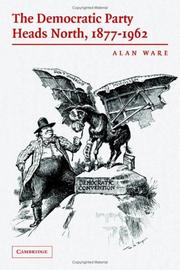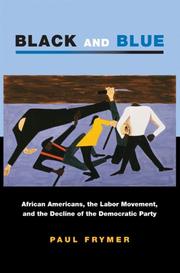| Listing 1 - 10 of 14 | << page >> |
Sort by
|
Book
Year: 1971 Publisher: Paris : Fayard,
Abstract | Keywords | Export | Availability | Bookmark
 Loading...
Loading...Choose an application
- Reference Manager
- EndNote
- RefWorks (Direct export to RefWorks)
Book
Year: 2017 Publisher: [Place of publication not identified] : Great Neck Publishing,
Abstract | Keywords | Export | Availability | Bookmark
 Loading...
Loading...Choose an application
- Reference Manager
- EndNote
- RefWorks (Direct export to RefWorks)
Book
Year: 1919 Publisher: New York : Columbia University,
Abstract | Keywords | Export | Availability | Bookmark
 Loading...
Loading...Choose an application
- Reference Manager
- EndNote
- RefWorks (Direct export to RefWorks)
Democratic Party (U.S.) --- History. --- United States --- Politics and government
Book
ISBN: 9791020905246 Year: 2017 Publisher: Paris : Les Liens qui libèrent,
Abstract | Keywords | Export | Availability | Bookmark
 Loading...
Loading...Choose an application
- Reference Manager
- EndNote
- RefWorks (Direct export to RefWorks)
Presidential candidates --- Presidents --- Attitudes. --- Political activity --- Election --- Democratic Party (U.S.)
Book
ISBN: 3531190091 Year: 2012 Publisher: Wiesbaden : Springer VS,
Abstract | Keywords | Export | Availability | Bookmark
 Loading...
Loading...Choose an application
- Reference Manager
- EndNote
- RefWorks (Direct export to RefWorks)
Eine attraktive demokratische Kultur ist keine Selbstverständlichkeit. Vielmehr müssen die Bedeutung und die Qualität demokratischer Werte und Normen immer wieder begreiflich und erlebbar gemacht werden. Aber welche Maßnahmen sind hierfür geeignet und welche nicht? Wie kann die Wirksamkeit von Programmen und Projekten optimiert werden? Wie kann sichergestellt werden, dass vorhandenes Wissen bei der Konzeption von Programmen und Projekten genutzt wird? Die BeitragsautorInnen geben Antworten auf diese Fragen. Ein Schwerpunkt liegt dabei auf methodischen und praktischen Aspekten der Evaluation. Daneben wird aber auch den bisher kaum diskutierten grundsätzlichen Folgen von Evaluationsaktivitäten für die demokratische Kultur und die moderne Gesellschaft nachgegangen.
Social sciences. --- Sociology. --- Methodology of the Social Sciences. --- Sociology, general. --- Political parties --- Democratic Party (U.S.)
Book
Year: 1923 Publisher: New York : Columbia University,
Abstract | Keywords | Export | Availability | Bookmark
 Loading...
Loading...Choose an application
- Reference Manager
- EndNote
- RefWorks (Direct export to RefWorks)
Democratic Party (U.S.) --- United States --- Etats-Unis --- Politics and government --- Politique et gouvernement
Book
Year: 2017 Publisher: [Place of publication not identified] : Great Neck Publishing,
Abstract | Keywords | Export | Availability | Bookmark
 Loading...
Loading...Choose an application
- Reference Manager
- EndNote
- RefWorks (Direct export to RefWorks)
Slavery. --- Democratic Party (U.S.) --- Wilmot proviso. --- United States --- Politics and government

ISBN: 0521858275 0521675006 9780511388828 0511388829 9780511611506 0511611501 9780521858274 9780521675000 1107177316 1281254533 9786611254537 0511387830 0511386842 0511385013 0511383142 Year: 2006 Publisher: Cambridge New York Cambridge University Press
Abstract | Keywords | Export | Availability | Bookmark
 Loading...
Loading...Choose an application
- Reference Manager
- EndNote
- RefWorks (Direct export to RefWorks)
This book examines the dynamics of the American party system and explores how contemporary American politics was formed. Specifically, it asks how the Democrats could become sufficiently competitive in the American North as to be able to construct a national political majority. It rejects the conventional account, based on 'realignment theory', that between the end of Reconstruction and the Civil Rights Revolution, the base level of support for the Democratic party varied greatly from one era to another. Instead, by distinguishing between the 'building blocks' available to the Democrats in coalition formation and the aggregation of those 'blocks' into an actual coalition, the author shows that there was much less variation over time in the available 'blocks' than is usually argued. Neither the economic depression of 1893 nor the New Deal had the impact on the party system that most political scientists claim.
Democratic Party (U.S.) --- History. --- History --- Demokratische Partei (U.S.) --- Partai Demokrat (U.S.) --- Republican Party (U.S. : 1792-1828) --- Social Sciences --- Political Science
Book
ISBN: 9780415962766 9780415962759 9780203884492 Year: 2009 Publisher: New York : Routledge,
Abstract | Keywords | Export | Availability | Bookmark
 Loading...
Loading...Choose an application
- Reference Manager
- EndNote
- RefWorks (Direct export to RefWorks)
Political parties --- Public opinion --- Partis politiques --- Opinion publique --- Public opinion. --- Opinion publique --- Democratic Party (U.S.) --- Republican Party (U.S. : 1854- ) --- Public opinion. --- Public opinion. --- United States --- Etats-Unis --- Politics and government. --- Politique et gouvernement

ISBN: 9780691134659 9780691130811 0691134650 0691130817 9786613133359 140083726X 1283133350 9781400837267 9781283133357 6613133353 Year: 2011 Volume: *17 Publisher: Princeton, NJ
Abstract | Keywords | Export | Availability | Bookmark
 Loading...
Loading...Choose an application
- Reference Manager
- EndNote
- RefWorks (Direct export to RefWorks)
In the 1930's, fewer than one in one hundred U.S. labor union members were African American. By 1980, the figure was more than one in five. Black and Blue explores the politics and history that led to this dramatic integration of organized labor. In the process, the book tells a broader story about how the Democratic Party unintentionally sowed the seeds of labor's decline. The labor and civil rights movements are the cornerstones of the Democratic Party, but for much of the twentieth century these movements worked independently of one another. Paul Frymer argues that as Democrats passed separate legislation to promote labor rights and racial equality they split the issues of class and race into two sets of institutions, neither of which had enough authority to integrate the labor movement. From this division, the courts became the leading enforcers of workplace civil rights, threatening unions with bankruptcy if they resisted integration. The courts' previously unappreciated power, however, was also a problem: in diversifying unions, judges and lawyers enfeebled them financially, thus democratizing through destruction. Sharply delineating the double-edged sword of state and legal power, Black and Blue chronicles an achievement that was as problematic as it was remarkable, and that demonstrates the deficiencies of race- and class-based understandings of labor, equality, and power in America.
Labor policy --- Labor unions --- African Americans --- Travail --- Syndicats --- Noirs américains --- History --- Civil rights --- Politique gouvernementale --- Histoire --- Droits --- Democratic Party (U.S.) --- United States --- Etats-Unis --- Race relations --- Relations raciales --- Noirs américains --- Demokratische Partei (U.S.) --- Partai Demokrat (U.S.) --- Republican Party (U.S. : 1792-1828) --- 20th century
| Listing 1 - 10 of 14 | << page >> |
Sort by
|

 Search
Search Feedback
Feedback About UniCat
About UniCat  Help
Help News
News